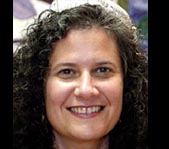One of my favorite programs at my synagogue is our B’nei Mitzvah family retreat. At the beginning of the summer, we take our incoming seventh grade families to camp for the weekend. It’s remarkable: relationships between kids change, parents get to know each other, and, after the Bar or Bat Mitzvah, we keep most of these kids in our Hebrew High program.
But one of my least favorite moments is what happens after Shabbat dinner. Sure, we talk about personal responsibility and the importance of cleaning up after you’ve finished, but every year the same thing happens. We have a lovely Kabbalat Shabbat and dinner is wonderful. The kids sit separate from the adults, finish sooner, and go outside. Since we end the meal with Birkat HaMazon, we call the kids back into the dining room and ask them to lead us in the prayer. But here’s the problem: their tables are a mess. When I ask them to clean up, the response is, “But I already cleaned up after myself. That’s someone else’s mess.” This makes me crazy. I try to explain that they are collectively responsible for making sure the table is clean; it’s not just about each person clearing their own stuff.
But let’s be honest: aren’t we all a bit like these kids? We don’t really want to clean up another person’s mess. It’s hard to take responsibility for problems we feel that we didn’t create. For example, signs of global climate change are all around us: earthquakes from fracking in Northern Texas, stronger hurricanes in the Atlantic Ocean, longer and more extreme droughts, and warmer oceans every year. But I didn’t emit most of that carbon; in fact, I recycle and compost and carbon-offset, so it’s someone else’s problem.
Parashat Shoftim highlights the question of communal responsibility for societal problems. At the end of the parashah we find a powerful and perplexing ritual, eglah arufah, which speaks to this human condition. The Torah addresses a difficult situation. What happens when a dead body is discovered in a field and nobody knows who is responsible for the murder?
Deuteronomy Chapter 21 begins:
1 If someone is found slain, laying in a field in the land the Lord your God is giving you to possess, and it is not known who the killer was, 2 your elders and judges shall go out and measure the distance from the body to the neighboring towns. 3 Then the elders of the town nearest the body shall take a heifer that has never been worked and has never worn a yoke 4 and lead it down to a valley that has not been plowed or planted and where there is a flowing stream. There in the valley they are to break the heifer’s neck. 5 The Levitical priests shall step forward, for the Lord your God has chosen them to minister and to pronounce blessings in the name of the Lord and to decide all cases of dispute and assault. 6 Then all the elders of the town nearest the body shall wash their hands over the heifer whose neck was broken in the valley, 7 and they shall declare: “Our hands did not shed this blood, nor did our eyes see it done.
While most of us are probably not very happy about the idea of breaking the neck of a calf, this ritual has a powerful lesson for us. Some commentators believe that this ritual was intended to find the one who committed the murder, but Samuel David Luzzatto, (1800-1865) taught that the purpose of the ritual was to strengthen the understanding that all of Israel are guarantors for each other. If we take the lesson of the eglah arufah to heart, we must all feel accountable for the mess we’ve created and together find ways to solve our problems.
But there’s still a gap between feeling accountable and actually taking action. What does it take to move us from guilt to prevention? Abarbanel (1437–1508) taught that the graphic nature of this ritual was to shock the people out of their normal routine, so that they would be forced to consider the social conditions that may have lead to a person being murdered in a field. It’s also noteworthy that the leaders must step up; where they go, presumably, the people will follow.
Whether it’s the shooting of an unarmed black teenager in St Louis or the genocide of Yazidis in Iraq, we should be shocked into taking some kind of action. And as religious leaders, the eglah arufah ritual teaches us to get out in front and start cleaning up the mess.
Rabbi Paula Marcus was ordained by the Academy for Jewish Religion in Los Angeles and has served Temple Beth El in Aptos, CA since 1979. Rabbi Marcus chairs the Ethics Committee of OHALAH-The Association of Rabbis for Jewish Renewal and is a member of the board of T’ruah.

